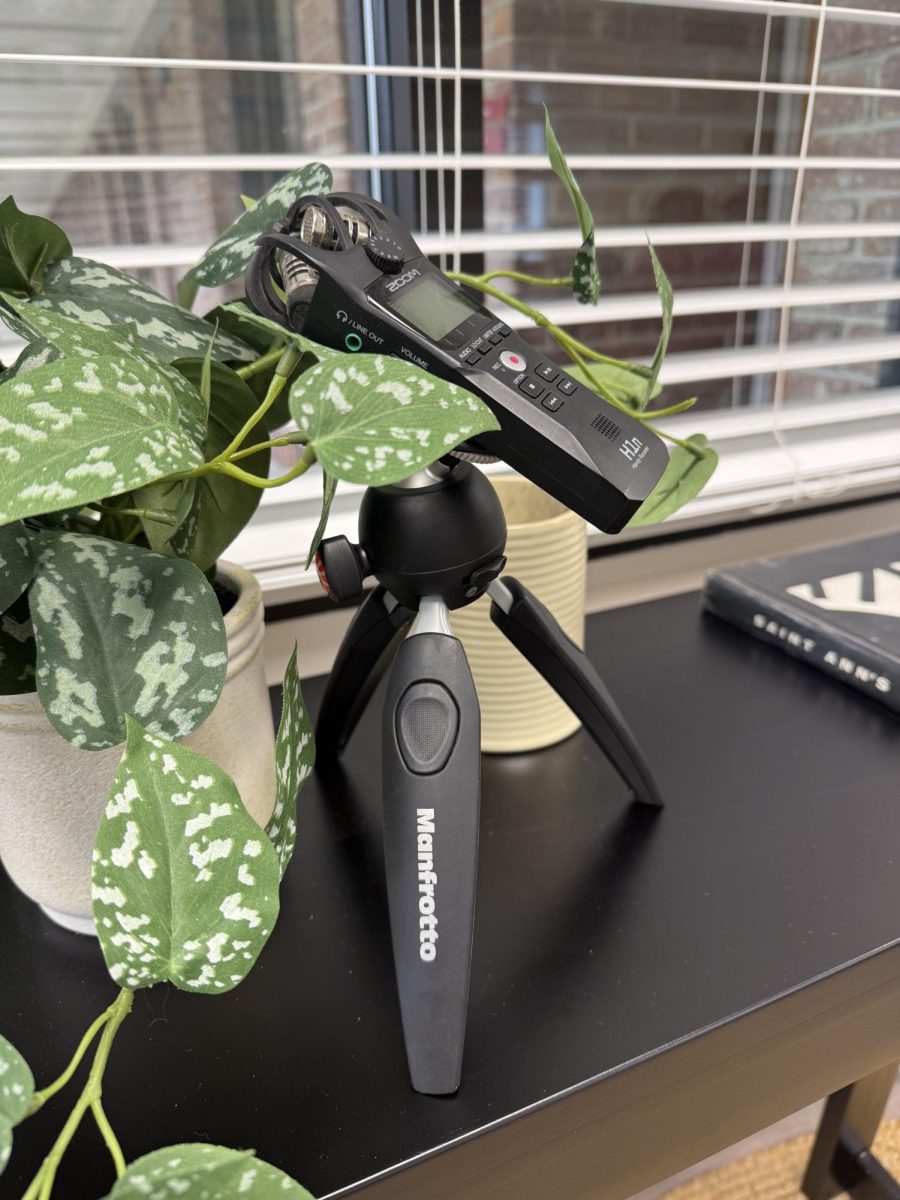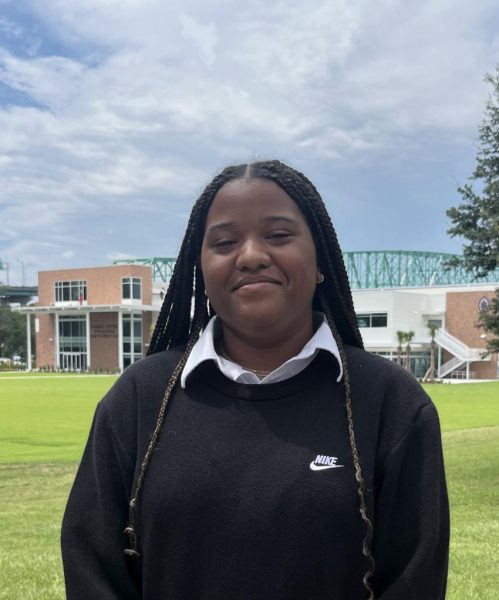There are many things that contribute to the performances of Episcopal. Often times the actions that are needed in order to make a show are overlooked. Things like lights and sound can’t just work automatically and need people to help coordinate and execute them. So I interviewed Ms. Megan Elsila, the Director of Technical Theatre, in order to get the full scope of how things work behind the curtain.
What do you mainly work on for productions?
The first thing is the calendar. I have to make sure that the calendar lines up with everybody’s schedules. A lot of what we do is really pressure-focused, and a lot of times we can’t just keep building and working. Then the next thing I do is read the script, and I start setting up production meetings. I just make sure that everybody is aware of the individual tasks they need to do. And then if the director wants to add to that, they add to that. If there’s projection, we start talking about what it’s gonna look like. Scenic design is usually presented during this time. At that point, I take the scenic design and start ordering materials from different places. Then basically we just try to communicate our separate work times, dress rehearsals, performances, tech rehearsals with everybody to see who wants to come and join us.
What is the process of making and presenting a show?
Oh there’s a lot of finesse in that. So just talking about like besides that huge process of just trying to get to the place where you’re taking two dimensional drawings and making them three dimensional, um, you really have to follow a calendar closely because the set has to be finished by a certain time, and the lights have to be finished by a certain time. So we can make the lighting happen and all of the coordinations between light sound set and projection and costumes, even when we actually kind of get into it. It becomes really very much kind of a live entity almost. It starts to take on its own personality and how it’s gonna look. So what you might have seen in a run through really starts to look different. When you have the set in place, you have the lighting in place, you have the projection and the sound in place and it starts to kind of almost come to life to say.
Is it hard to keep things consistent?
Well, we write everything down. So we have stage managers, we have students, stage managers who are trained to write everything. So they’re aware of whether there’s a scenic move or if there’s a sound cue or if there’s music or if there’s a lighting cue, it’s written in a script, and it’s recorded on the execution of that cue.”
What is your least favorite part about the process?
I think my least favorite part is when somebody thinks they don’t think tech needs something. It creates more pressure on us to be asked to perform at such a high level or an elite level without really having people there to stand where those lights really need to go or where that sound really needs to go and that sort of thing. You can’t recreate moments without having people there making those moments. It’s frustrating if you have somebody who just doesn’t see the, the time that goes into the art of it or changes things constantly because they think that we should be able to adapt quickly.”
What is your favorite part of the process?
“I love to create, not only do I love to create because that’s one part of it. I love lighting for dance. I love lighting in general. I love creating something from nothing into a realized community project. And it is a community project because it takes all of us to do it. It’s not just one person. So creation has always been at the heart of everything I’ve done. And then in addition to that is teaching, I do love to teach an interested student. I love to give the ownership and just hand over the baton and be like this is your show, call it, it’s all yours, and to be able to train them to a place where they feel confident enough to do something very complex. And it is complex to have these students calling these shows which can have like over 150 to 200 light cues, over you know, 20 to 40 projection cues, maybe 50 sound cues. And to be able to coordinate through all three of those different ways.”
When did you realize that you wanted to do this as a job?
So I was actually an actor from middle school to high school. I did that, and then I decided I love math, math is one of my favorite subjects. My work study happened to be in the theater. I thought it was gonna be in the box office or something and they were like, “no, you work studies” You’re gonna be cutting wood and helping build the sets. And I was like, I’m gonna get paid for that? I was like, “we didn’t have sets in high school.” And so, that’s where I met my mentor, Johnny Pettigrew. I met him when I was 17. He was my college professor for three years. He left my senior year to go build a huge facility at FSCJ. And I learned everything from him, and after my first semester, I actually changed my major from accounting to technical theater.”
What is something you wish people knew about tech?
Don’t ever say anything is easy, and we really don’t like to be. “Well, it’s an easy show. It’s simple.” No, it’s never easy or simple. It may look like it’s easy and simple. But that’s because we’ve made it look like it’s easy and simple, but it’s not easy and simple. It’s a lot of moving parts, and a lot of times people don’t realize, like, I didn’t realize how much that went into this. Even I didn’t, when I started working backstage. There’s a whole other world back here that about 60% to 70% of the population has like no clue what goes into a production and how many people are actually working on it to make it seem as flawless and as just simple and easy as possible.”
Do you have any advice for anyone that might want to join theater tech or a similar field?
I would say the first thing is to find a mentor, um, find somebody who believes in you, somebody who thinks that you have a talent for whatever it is you wanna do and, um, and develop that relationship so that you can become better at what you do. It’s really hard to become really better in this field. For the first like six to seven years I didn’t have kids that went into this field. They were going to become a lawyer, a doctor or something big. So what I always told them was like, even if this isn’t what you do for the rest of your life, find a way to still do it. Find a community theater in the city you’re living in, find a high school theater, find something where if you’re not participating and creating and making that theater happen, please go watch it like help out with like the community or help out or just be an audience member because you’ll still remember that love that you had for it as a young person. And that’s really what life is about is creating memories and moments and experiences. And you wanna just always have that at your forefront. You don’t want to keep your life in a dark place. You wanna keep it in a light place. And by doing that, you find the things that really brought you joy as a child and keep putting them in your life as you get older.
Tech theater is a fascinating field that requires a lot of work and dedication. Ms. Elsila has a large passion for technical theater. Even if the work isn’t always easy, she makes sure each show is the best it can be. Thank you Ms. Elsila for all of the hard work you do, bringing life to the shows of Episcopal!
Image courtesy of Episcopal.








